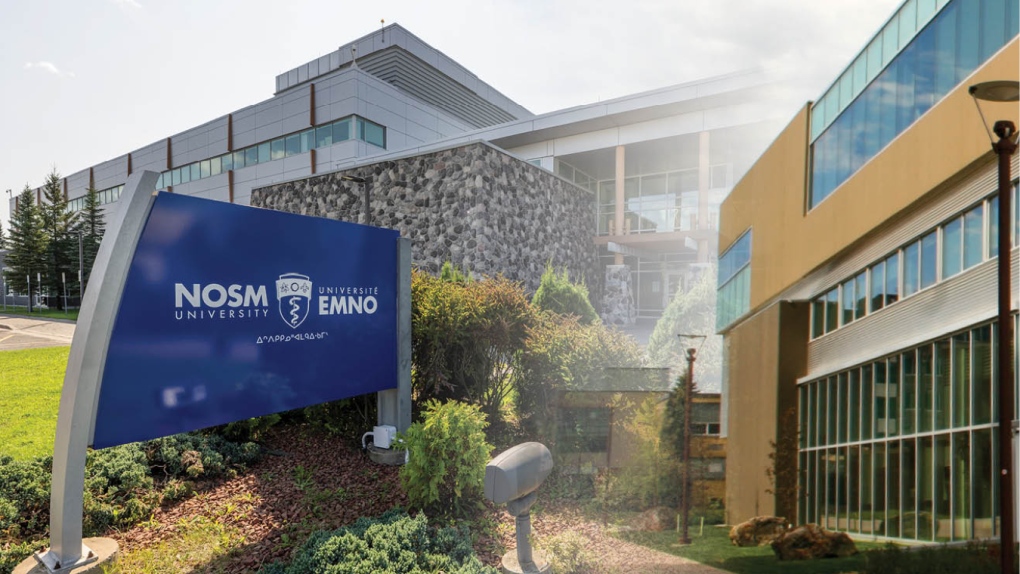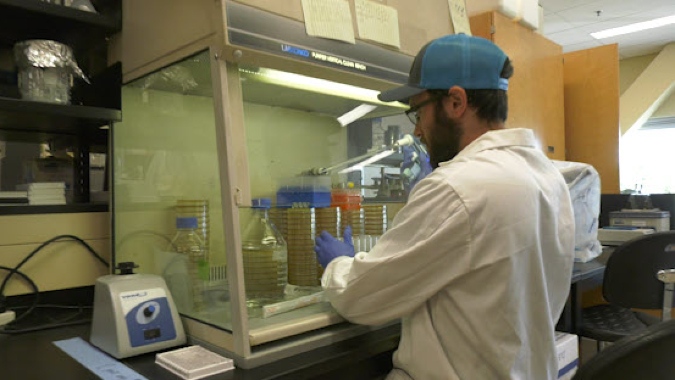
Northern medical school receives funding to research occupational cancer
A research team at Greater Sudbury's NOSM University has received $200,000 in funding to examine occupational-related cancer caused by radon inhalation.
 NOSM University, formerly the Northern Ontario School of Medicine, teaches medical students at campuses in Sudbury and Thunder Bay and was the first Canadian medical school to be given degree-granting status as an independent university. An undated photo of the NOSM Sudbury campus. (Supplied/NOSM University)
NOSM University, formerly the Northern Ontario School of Medicine, teaches medical students at campuses in Sudbury and Thunder Bay and was the first Canadian medical school to be given degree-granting status as an independent university. An undated photo of the NOSM Sudbury campus. (Supplied/NOSM University)
The Canadian Cancer Society (CCS), along with the Canadian Institutes of Health Research-Institute of Cancer Research and 14 workers’ compensation boards and labour unions across the country, announced a new program on Wednesday to decrease the number of cancer diagnoses caused by the workplace.
Morgane Morabito, the Cancer Society’s senior manager of research programs, said there's a lack of research and awareness about cancer caused by the workplace.
"Each year, there are approximately 10,000 newly diagnosed cancer that that would be preventable," she said.
"That could be preventable if there was guidelines, for example, about prevention. If we have a better understanding why where they come from, what are the risks that would cause those kind of workplace related cancers?"
 An undated photo of Morgane Morabito, the Canadian Cancer Society’s senior manager of research programs. (Morgane Morabito/X)
An undated photo of Morgane Morabito, the Canadian Cancer Society’s senior manager of research programs. (Morgane Morabito/X)
NOSM’s study is one of seven projects across Canada that will receive funding from the CCS Workplace Cancer Research Grants: Preventing Occupational Cancers program.
Chris Thome, an assistant professor at medical school who will lead the project, told CTV News that little is known about radon inhalation's effect on the lungs.
"Health Canada cites radon gas as the second leading cause of lung cancer but there's not a lot of research has actually been done into understanding what happens to the tissue in our lungs when we inhale radon and what the actual levels of risk are," he said.
“We want to understand more about how radon actually interacts with our lung tissue, what those risk levels are."
 Chris Thome, an assistant professor at NOSM University will lead a new study examining occupational-related cancer caused by radon inhalation. (Supplied/NOSM University)
Chris Thome, an assistant professor at NOSM University will lead a new study examining occupational-related cancer caused by radon inhalation. (Supplied/NOSM University)
Thome said some parts of northern Ontario have naturally higher levels of radon.
"It's something that we're exposed to every day. Radon gas is a naturally occurring radioactive gas. But even though it's something that we're all exposed to everyday, we still don't know a lot about it," he said.
"This research will not only advance our understanding of how radon interacts with biological tissue, it will help us to understand the risks."
Thome said radon is found in basements and underground, so it especially poses a risk to miners.
"A lot of these mines do have physical mitigation strategies where they things like ventilation within the mines that helps to reduce radon levels," he said.
"But some residential houses and some occupations have radon levels that are above the Health Canada guidelines and so we're trying to investigate ways that we can prevent any adverse effects to those individuals."
Morabito said a number of professions face higher risks.
"It's going to be manufacturing, it's going to be construction, it's going to be mining, law enforcement and enforcement and healthcare, and shift work," she said.
"The number right now is like 6.8 million is the pool of workers currently that will be fighting those criteria at risk of workplace-related cancers. So it is an urgent need to really protect these workers across Canada."
Thome said the goal of the research is to also find solutions through the development of a dietary supplement.
"The supplement could be used as a way to prevent some of that damage that can happen to your lungs when you inhale radon and ultimately prevent lung cancer formation," he said.
 A research team -- including three staff and three students -- at NOSM University has received $200,000 in funding to examine occupational-related cancer caused by radon inhalation. (Amanda Hicks/CTV News Northern Ontaio)
A research team -- including three staff and three students -- at NOSM University has received $200,000 in funding to examine occupational-related cancer caused by radon inhalation. (Amanda Hicks/CTV News Northern Ontaio)
Through a separate grant, he said a custom-designed radon chamber would be built for controlled experiments to look at different concentrations of radon gas and look at the physiology of what happens to the lung when various model systems are exposed to radon.
Thome said NOSM received its first instalment of the grant and will now begin experiments and data collection – adding three students and two additional faculty members will work on the project, with preliminary findings released sometime next year.
CTVNews.ca Top Stories

DEVELOPING Live updates: Hurricane Milton set to make imminent landfall in Florida
Hurricane Milton is set to make imminent landfall on Florida's west coast. The storm is 20 miles (30 kilometres) southwest of Sarasota with maximum sustained winds of 120 m.p.h. (195 km/h).
Hundreds of thousands of popular vehicles recalled in Canada over steering issue
Hundreds of thousands of vehicles are being recalled in Canada due to a steering-related issue that could increase a driver's risk of crash.
'We want things to go forward': Bloc leader hints his party 'might' help end House impasse
The leader of the Bloc Quebecois says his party 'might play a role' in helping the Liberals get House of Commons business rolling again — after days of Conservative-led debate on a privilege matter — but that his assistance would come at a cost.
video Why are there cars in the Detroit River?
Dozens of cars were pulled out of the Detroit River in west Windsor on Tuesday, causing many questions for Windsorites.
Washington state woman calls 911 after being hounded by up to 100 raccoons
Sheriff's deputies in Washington's Kitsap County frequently get calls about animals -- loose livestock, problem dogs. But the 911 call they received recently from a woman being hounded by dozens of raccoons swarming her home near Poulsbo stood out.
Pilot dies aboard Turkish Airlines flight, forcing emergency landing in New York
A Turkish Airlines jetliner headed from Seattle to Istanbul made an emergency landing in New York on Wednesday after the captain died on board, an airline official said.
Former CIA director says Israel 'unlikely' to target Iranian nuclear sites as retaliation
Former CIA Director and retired Gen. David Petraeus says it is 'unlikely' Israel will target Iranian nuclear sites in retaliation for last week's ballistic missile attack.
Rare Monet returned to family more than 80 years after it was stolen by Nazis
A Claude Monet pastel painting stolen by Nazis during World War II, which vanished for decades only to show up with a Louisiana art dealer, was returned Wednesday in New Orleans to the descendants of its original owners.
Women say they were kicked off of Spirit Airlines flight for what they were wearing
Two Orange County women are speaking out after they say they were kicked off of a Spirit Airlines flight because of what they were wearing.

































